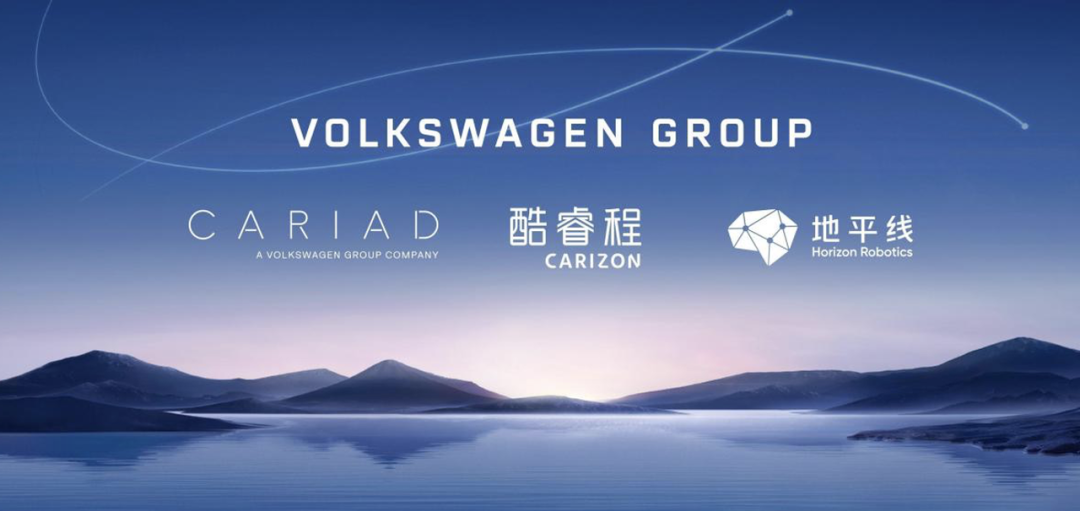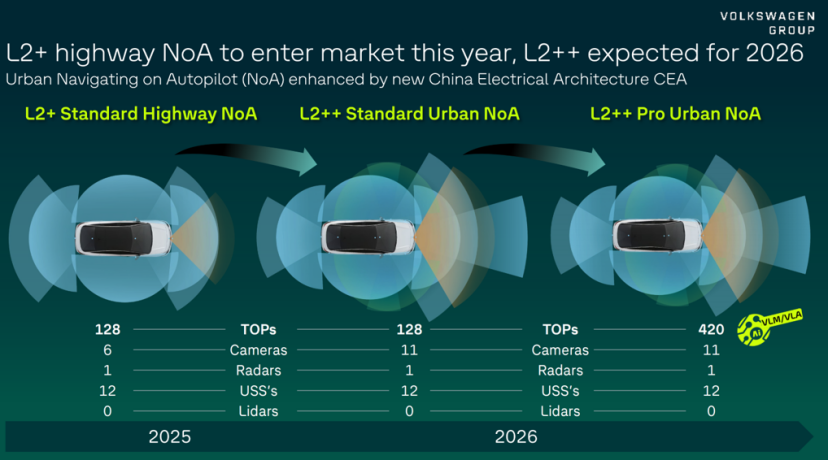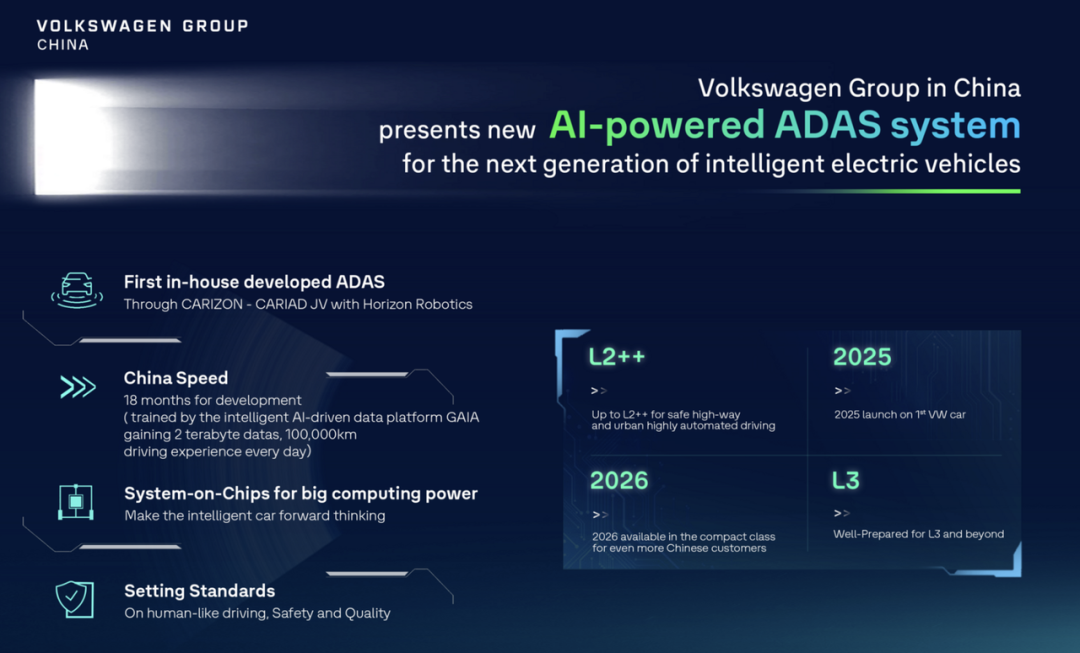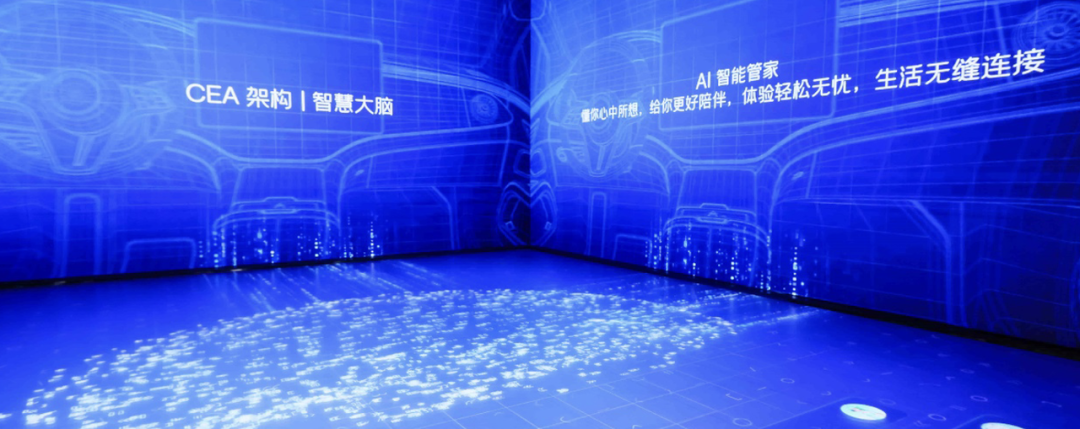Will Volkswagen Group Develop Its Own System-Level Chips?
![]() 11/06 2025
11/06 2025
![]() 608
608
Produced by Zhineng Zhixin
Volkswagen Unveils Major Announcement at CIIE
Volkswagen has made a groundbreaking announcement at the China International Import Expo (CIIE), revealing its plans to develop its own system-level chips (SoCs) in China. This strategic move marks a significant shift from relying on external chip suppliers to establishing a local self-development system. Through its joint venture with Horizon Robotics, named 'CARIZON,' Volkswagen aims to achieve vertical integration of chips, algorithms, and systems. This integration will provide Volkswagen with crucial computational power and core control over autonomous driving technologies.
Objectively, Volkswagen's intelligent driving system in the Chinese market is evolving rapidly, venturing into the realm of customized chips. The focus is transitioning from mere software implementation to a collaborative hardware-software approach, and from functional adherence to locally defined standards.

Part 1: The Strategy of Self-Developed Chips: From System Integration to Technological Sovereignty
Volkswagen Group's decision to independently design and develop system-level chips in China represents a major departure from traditional models that heavily rely on external supply chains. Self-developed chips offer several distinct advantages.
According to the plan, the SoC chip will be developed by CARIZON, a joint venture formed by CARIAD and Horizon Robotics. The primary goal is to provide computational support for Volkswagen Group's future L3-level and above autonomous driving systems in China.
The chip's computational power can reach between 500 to 700 TOPS (trillion operations per second), achieving an optimal balance between high efficiency and low energy consumption through advanced algorithm and power optimization techniques. This level of performance is adequate to support urban Navigation on Autopilot (NOA), high-speed scenario perception and decision-making, and multi-sensor fusion processing. This marks a significant step in the evolution of intelligent driving chips towards automotive-grade AI platforms.

The chip will be responsible for handling fusion computing tasks for multi-modal sensor data (including cameras, millimeter-wave radar, and LiDAR) collected by the vehicle. This enables real-time understanding and decision-making output for the road environment.
Its design philosophy is centered around 'efficient performance' — through hardware-software collaboration, it achieves an optimal balance between computational latency, energy consumption, and safety redundancy. In complex urban traffic environments, the SoC can complete path planning and braking decisions within milliseconds, significantly enhancing the safety and responsiveness of the autonomous driving system.

From an industrial perspective, this initiative represents a reconfiguration of Volkswagen's technological sovereignty.
Previously, Volkswagen's ADAS and autonomous driving controllers were predominantly supplied by external vendors such as Bosch, ZF, and NVIDIA, with software development and computational chips operating in a separated state.
Self-developed SoCs will bridge the gap between the algorithm, software, and hardware layers, enabling Volkswagen to possess a more comprehensive full-stack R&D capability. This integrated model not only shortens system verification cycles and reduces supply costs but also provides greater flexibility for subsequent functional iterations.
The involvement of Horizon Robotics is pivotal. As a leading provider of automotive-grade AI chips and algorithm platforms in China, Horizon Robotics has accumulated deep expertise in BPU architecture, model compression, and local mass production capabilities. Its Journey series chips are already widely adopted by mainstream domestic automakers.
The joint venture, CARIZON, will merge Volkswagen's global experience in system engineering, functional safety, and vehicle validation with Horizon Robotics' innovative capabilities in computational architecture and local ecosystems. This synergy of 'European standards + Chinese speed' grants Volkswagen unprecedented flexibility and cost efficiency in chip development.
Volkswagen is transforming from a 'system integrator' to an 'intelligent platform definer.' Through self-developed SoCs, Volkswagen can achieve autonomous customization of intelligent driving systems in future models, better control safety certifications, data interfaces, and OTA upgrade rhythms, and gradually reduce structural dependence on suppliers in the fiercely competitive intelligent driving arena.
Part 2: Local Reconfiguration of China's Intelligent Driving Ecosystem
Self-developed chips signify a deepening of Volkswagen's localization strategy, with the Group advancing from localized manufacturing to localized core R&D.
The first models equipped with chips developed by CARIZON will be delivered to Chinese consumers starting in 2026, featuring L3-level and above intelligent driving systems. Paired with its new-generation regional control electronic electrical architecture (CEA), Volkswagen will construct a local intelligent driving ecosystem in China encompassing 'chips-software-systems-vehicles.'
From underlying computational power to upper-layer algorithms, Volkswagen will achieve a full local closed-loop from definition to verification, significantly shortening R&D cycles and enhancing adaptability to Chinese user scenarios.

China's complex traffic environments and diverse driving behaviors pose higher demands on autonomous driving systems.
Whether it's navigating through urban congestion, driving at night, dealing with non-standard lanes, or handling scenarios involving mixed traffic with two-wheelers and pedestrians, algorithm models require more frequent data training and rapid iteration. China's robust AI ecosystem, mapping services, and high-precision sensor industry provide fertile ground for such scenario-based R&D.
Through deep collaboration with Horizon Robotics, Volkswagen can directly tap into local innovation achievements, synchronizing algorithm optimization, chip verification, and vehicle debugging — a process nearly unimaginable in the R&D systems of previous multinational automakers.
The CARIZON chip project is an extension of Volkswagen's VCTC intelligent driving R&D system, achieving a software-hardware integrated layout through self-developed chips.
This move not only brings Volkswagen closer to Chinese consumer needs but also positions China as a critical source of innovation within the group's global R&D network.
Over the past two years, domestic brands have established significant advantages in intelligent driving experience and cost efficiency, particularly Huawei, Xpeng, and Li Auto, which are leading in urban NOA deployment.
Volkswagen's joint venture models, such as the ID. series, while advancing rapidly in electrification, still lag behind domestic brands in intelligent driving experience and system responsiveness. The launch of self-developed SoCs represents a crucial breakthrough for Volkswagen to re-establish its voice in the competitive intelligent driving landscape.
From a supply chain perspective, Volkswagen's advancement in self-developed chips will drive local automotive electronics ecosystems.
Through collaboration with Horizon Robotics, related processes such as packaging testing, algorithm optimization, system verification, and safety assessment will increasingly be localized in China. This means local suppliers will gain greater opportunities to participate in the development of high-end automotive computing platforms, accumulating new engineering and mass production experience for China's automotive chip ecosystem.
Summary
By self-developing system-level chips in China, Volkswagen Group, through local self-development, hardware-software collaboration, and ecosystem co-construction, may gradually accelerate its R&D efforts and solidify its position in the Chinese market.








